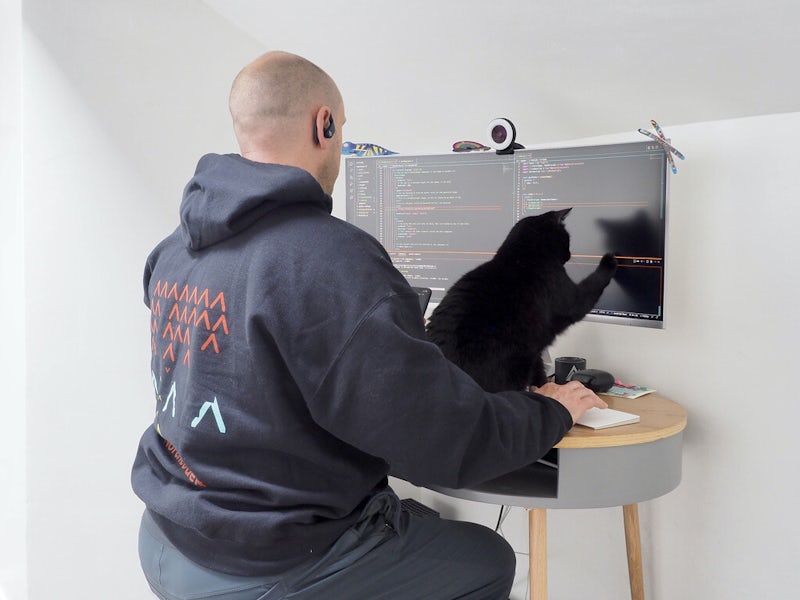Bootcamp Life
The Northcoders Experience

In October 2021 I got the anticipated rejection email for a junior Ruby developer role. It wasn’t really any great surprise but felt like a blow nonetheless. I’d put a lot of work into the application and the subsequent weeks, preparing for the million to one shot that I might get offered an interview.
I was pretty sure that somewhere along this foretold interview conversation, a technical query would become my proverbial brick wall, but if I could only have gotten to that stage, maybe I could have convinced them to take a chance on wildcard? At the very least a new obstacle could have been identified, allowing me to formulate a plan and equip myself with the skills to overcome it.
Instead, I got the default rejection, which for someone who tries to be proactive when faced with a problem, doesn’t give me much to work with.
What clue it did provide is that I was still a galactic distance from having any real employable tech skills, which on reflection was actually quite useful.
I’d been learning some coding skills during the lockdown of 2020 between erratic snippets of short term work. The progress was painfully slow and a typical example of the analogy of pulling a train (gaining momentum is the hardest bit). I knew it would be a challenge but I hadn’t foreseen the effort in learning even the associated dependencies of becoming Tech proficient, which compounded to add more carriages to this train analogy.
The initial disillusionment, followed by subsequent defiance, initiated a review of my strategy. I began a new investigation to discover possible options and during this search, I unearthed Northcoders and its coding bootcamp.
It served as a beacon of hope. I had realised that for substantial progress I needed structure, guidance and a challenging pace, a bootcamp seemed to fit the bill. They say be careful what you wish for, that was certainly what I got.
The application itself required a body of preparation work to lay the foundations for a technical entry test before being allocated to the next cohort. I didn’t want to lose any time so the next couple of weeks felt relatively intense as I worked through the material and subsequently the technical test. I passed but much in the same way I often seem to pass tests, with a bit of a scrape, always the MVP.
The following week rolled into the intro week for that cohort and the journey began.
I have to admit I found the pace tough. Even into the first block of Javascript fundamentals I had moments where I felt like I was starting to sink. The content was comprehensive with a distinct lack of fluff. Every day was another concept to digest, understand and apply.
To account for the mixture of student’s locations, all lectures were taught over Zoom which normalised very quickly.
A surprising quirk of this format soon emerged in the banter that began to fill the Zoom chat.
The demographic across the cohort was quite broad but it soon became clear that there were some sharp minds among us and some equally sharp humour. There was more than one occasion when I actually laughed out loud at the chat banter, which for a stoney faced stoic like myself is unusual. It brought some wonderful levity to what can feel like a tough course at times. It’s amazing how comforting a little wry humour can be when you feel like the only person in the room who doesn’t get it.
I would have loved to have been more involved in the banter, but regrettably I’m not that funny and for another I type like I’m wearing boxing gloves as soon as the setting becomes public.
Why is that?
My typing has come on massively since my head down, two finger pecking days. As part of improving my overall computer competency I’ve learnt to touch type, yet introduce any observers and it’s like I’ve regressed to typing like my Dad.
During the course there were times when I felt like I was going under and I’m still rereading some of the technical concepts to hammer home the understanding; yet for each day of desperate struggle, there was always another day when things went well.
In my previous career as a chef you can have some rough days and we had a saying that you never have two bad days in a row. Maybe its attitude and you just return determined to have a better day than yesterday, maybe you arrive prepared for the worst which never seems to happen, maybe the universe just cuts you some slack. Coding seems to be similar.
Pair programming was introduced early on in the course and despite my loner reluctance, was actually predominantly a very positive experience. There was always an unsubstantiated anxiety prior to pairing, which I think largely came from a place of insecurity and a need to feel useful (rather than useless).
It was always unfounded, pair programming is a concept fundamentally destined to succeed. If you are the least experienced of a pairing, you gain valuable insight from a more experienced partner, if you are more experienced you have the value of developing the skill to articulate your knowledge, whilst having a positive impact on another person. In the scenario when neither of you have a clue, there is solace that you aren’t the only one who struggles and a camaraderie emerges from tackling a problem together, along with shared success.
Also the value of a second pair of eyes that notices a typo cannot be underestimated.

The solo projects were intimidating but hugely rewarding. Reflecting back on a codebase that you’ve created makes you wonder if it was really you, yet being able to explain it to a non coder really demonstrates how far you’ve come.
The tutors were all excellent, in both knowledge but also support and empathy with the struggle. For many people, myself included, this isn’t just a course, it’s a career shift, a big life decision which can have a lot riding on it. This puts tremendous pressure on your perceived success which can become a burden, especially when tackling gnarly concepts like closure for the first time.
It seems like Northcoders is doing a great job of maintaining its cultural vision as it grows. Three of my cohort’s students were recruited as tutors at the end of the course. I was fortunate to have paired with two of them and having spent time with them first hand, I’m sure they will be great.
Experiencing the bootcamp it soon becomes clear that this is not a level field. Some people have other coding competencies or experience as a foundation, some have educational backgrounds that align well with the subject matter and some are just super smart cookies with a rapid ability to absorb the content and apply it.
For an individual like myself, who doesn’t fit any of the criteria above, it’s an important skill in itself not to compare to others. To do so only has outcomes of feelings of inadequacy and they aren’t reasonable or objective.
Learning to code is a long play and not an easy one either. This needs to be acknowledged and respected. The nature of computers means that whilst there can be simplicity over complexity, it is still completely literal. In the mind of a computer there is no ambiguity, it is wrong until it’s right. You can’t blag your way through like you would with your rusty GCSE French on a holiday in Provence, even the most simple piece of code has to be correct.
This can be tough as you learn but you come to accept and understand it. Along the way you get more comfortable with not knowing and the progression of moving from each problem to solve, to the next.
Here is where I take away one of the greatest benefits I've gained from the Northcoders Bootcamp. I’ve learnt a lot but I realise these are just the beginnings of a foundation. It's the confidence to tackle and learn new things in Tech that has substantial long term value. The process doesn’t intimidate me now.
My coding skills need to be developed and honed further before I can hold my own in a professional team. Sure it will take time and effort but what skill doesn’t take time to develop?
I’m ok with that and grateful for the experience of Northcoders helping me to get there.


James Grant
Graduate




